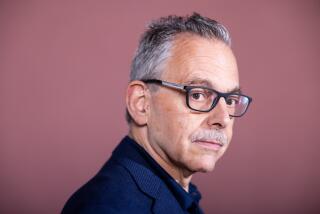Along With Vegetables, Retired Preacher Cultivates Insights to Nourish Hungry
- Share via
Wilbur R. Johnson settled between his van’s tailgate and a mound of beets and greeted the passing hordes at the weekly farmers’ market at Villa Parke in Pasadena.
Many passers-by stopped and kissed him. Others hugged or patted him, called out his name, asked for advice on gardening and cooking or simply stared at all the action. Johnson, 64, former pastor of Scott United Methodist Church in Pasadena, was once again happily reigning over what he calls his “vegetable kingdom.” His new ministry allows him to combine lifelong passions for humanity and horticulture.
Every morning at sunrise, Johnson tends his organic garden. Almost daily he harvests some beets, peas, collards, zucchini or a variety of herbs to sell at the farmers’ market at the Villa Parke Recreation Center in Pasadena and at a similar market in Santa Monica. His is one of the smallest concessions, offering just the vegetables and herbs that he can transport in his van. He says he gives a lot of the produce away because his practiced eye can spot hungry, needy people.
“There are many fascinating spiritual insights one can draw from such things as tomatoes and strawberries and corn,” said Johnson, who took a disability retirement from his church in 1980 but still serves as a frequent guest preacher.
In his sermons, he said, he talks about how vegetables can weather bad seasons and adds: “None of life’s experiences need scorch us or make us bitter and unresponsive.” Or he may refer to the need for “a vigorous spiritual root system to give us sustenance in times of drought.”
At the weekly markets, Johnson delivers another kind of message. When selling collard greens, for example, he will point out the vegetable’s high vitamin and mineral content and note that the greens have “a wonderful history of sustaining people in hard times.”
Then he gives the recipe: “Boil with a ham hock, a little safflower oil, garlic and red pepper and serve with corn bread and yams.”
He calls out, “Try these sugar snap peas. Eat ‘em pods and all, and you’re hooked for life.”
Johnson received his degree in theology at Boston University after graduating from Wilberforce University in Ohio. He was executive director of the Arizona State Civil Rights Commission from 1966 to 1968. In Pasadena, he has been president of the Interdenominational Ministerial Alliance and Ecumenical Council of Churches.
Last November he received the Joshua Award for outstanding service to the community from the Eastern Region of the Jewish Federation Council of Greater Los Angeles. He and his wife, Elinor, live in a spacious, book-filled home in Altadena with a brilliant flower garden in front.
Johnson said his education, Christian ministry and gardening interest all came about because polio crippled his legs at age 16. He is one of an estimated 70,000 of the nation’s 300,000 polio victims suffering after-effects in later years. His pain and disability are increasing, Johnson said, and he often uses a wheelchair outdoors, although by moving slowly and carefully he is able to garden without it.
A native of Pasadena, he remembers “growing up as a little black kid. All of us were tough--we were castaways. But (because of polio) I was spared the disillusionment of running down the primrose path of sports. I was forced to develop this ordinary mind in order to survive.
“Most of my peers frittered away their lives. Learning, that’s my theme, not bouncing a big fat basketball.”
Pasadena in the 1930s, Johnson recalled, was a city of wealthy families where his father was a butler. Black children were not expected to be educated, other than “to learn how to be better and better servants.”
The polio turned out to be “a blessing in disguise,” Johnson said. Because of it and because of his parents’ insistence on education, “I had to grow up and out of my blackness. I’m still doing that. As my body deteriorates, my mind is growing. I’m trying to do something about what I can do something about.
“I don’t know how long I’ll be able to continue. But I can’t sit home in pain. I have to figure out my assets and keep going.”






